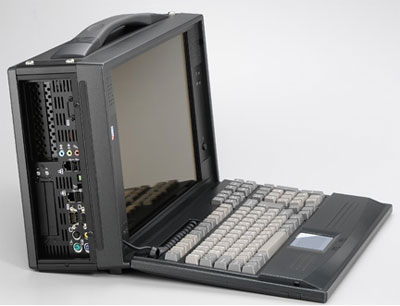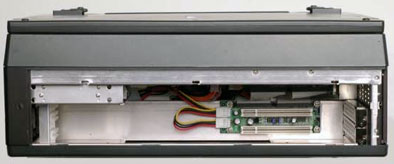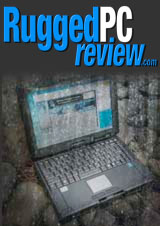Note: As of 11/2011, the Tenuis 100 Plus appears to have been replaced by the Tenuis 200 with apparently the same specs.
Not all computing tasks are simple, and there are times when you need certain expansion cards to get a job done in the field. Unfortunately, standard mobile computers do not have expansion slots, and certainly not the full-size PCI slots many high-powered cards come in. There are portable systems that can accommodate cards, but most require AC power and that is not always available in the field. Which means there is a niche for a battery-powered portable computer with PCI expansion slots. And that is exactly what the Tenuis 100 Plus from ACME Portable Machines is designed for.

As far as specifications go, the Tenuis 100 Plus provides healthy Intel Core 2 Duo power with its 2.16GHz T7400 processor. For storage you get an internal 2.5-inch IDE disk and ample room for expansion via two 2.5-inch SATA removable HDD bays. The main attraction, of course, are the two desktop-style full-size PCI-32 slots, one of them a standard PCI slot and the other a PCI-e slot. A mini-PCI slots provides additional expansion for things like wireless cards.
A desktop-style setup usually requires desktop-style power, i.e. you have to plug it in. ACME addressed this issue by designing the Tenuis 100 Plus for use with two high capacity Li-Ion packs that deliver a combined 190 watt-hours. That compares to the 40-80 watt-hours capacity of most full-size notebook computers. That should be good for a couple of hours between charges, enough for many field deployments. The presence of the batteries are also what separates the Tenuis "Plus" from the standard Tenuis model.
Anything that accommodates full-size PCI cards and includes multiple 2.5-inch drives and two big batteries will likely be a sizeable affair, but the Tenuis is actually fairly compact with a footprint of 16.4 x 11.4 inches and a depth of 6.4 inches. The whole package, which also includes a 15-inch XGA (1024 x 768 pixel) display protected by tempered glass, weighs about 20 pounds. That's twice as much as most rugged notebooks, but still portable.

For connectivity there are four USB 2.0 ports and two RJ45 LAN ports, one of them capable of gigabit speeds. Whatever additional connectivity or functionality is needed can be added via PCI card. Data acquisition and test & measurement peripheral cards come to mind.
Founded in 1994, ACME Portable Machines, Inc. is a manufacturer and distributor of rugged portable computer workstations, chassis, and LCD keyboard drawers. The company is headquartered in Los Angeles, California, with sales and service centers in the U.S., Europe and Asia.



